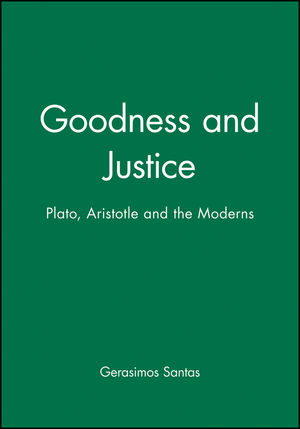Goodness and Justice: Plato, Aristotle and the ModernsISBN: 978-0-631-17259-8
Hardcover
320 pages
October 2001, Wiley-Blackwell
 |
||||||
Georgios Anagnostopoulos, University of California at San Diego <!--end-->
"One of the very greatest Socrates scholars of the twentieth
century – here in finer form than ever – now brings us
the fruits of decades of reading and teaching the ethics and social
philosophy of Plato and Aristotle viewed in the light of John
Rawls's theory of justice. The two chapters on Justice in the
Republic are not only refreshing but also as illuminating as
anything ever written on that topic. For everyone, from the
greatest scholar to the beginning student, this book is a lesson
both in how to do philosophy and how to read texts." Terry
Penner, University of Wisconsin
"This wonderful book on the fundamental concept of goodness is
the harvest of a lifetime's reflection on ancient and modern
ethics. Its bounty includes the isolation of two theories of good
in Plato's Republic – a functional theory and a
metaphysical theory – an account of the Form of the Good that
rescues the pinnacle of Plato's philosophy from the charge of
vacuity, and a discussion of Aristotle's rejection of the
metaphysical theory and his embrace of the functional. It is a
virtual commentary on both the Republic and the
Nicomachean Ethics. Truly a masterwork." David Keyt,
University of Washington
"This is the most insightful overarching analysis of the good in
Plato and Aristotle of recent decades. Santas offers a
comprehensive framework for the classification, and detailed
discussion, of Plato's and Aristotle's theories of good, with
valuable comparisons to positions in the history of philosophy and
contemporary debates. A very wise investment for moral and ancient
philosophers." Theodore Scaltsas, University of
Edinburgh
"Acute, close analysis characterizes Santas's book
throughout...beautifully clear, a joy to read." MF Burnyeat,
TLS, 14th June 2002
"... This book offers a capacious, clear and careful exploration of the centrality of concepts of the good to these two ancient philosophers (Plato, Aristotle), showing how ethics and politics drive epistemology and metaphysics and ... comparing the resulting structures with those of John Rawls and other modern theorists. The result is an impressive achievement..." Polis, Vol. 20, 2003



